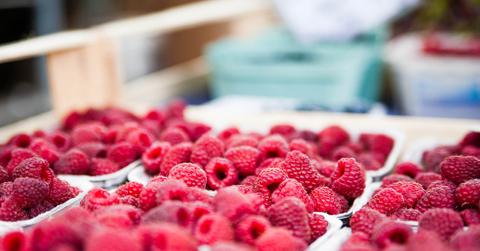Free Grocery Store Goes From Art Project To Feeding Thousands
A group of volunteers have grown the concept of a two week art project into a full-fledged free grocery store with four locations that saves $22,ooo worth of food every week. Even better, they're feeding those in need, no questions asked.
Updated May 26 2019, 11:38 a.m. ET
In 2010, an artist named Kim Paton opened up a grocery store in Wellington, New Zealand, and filled the shelves with leftover from other supermarkets and bakeries in the area. Anyone who wanted to could come in and take something to eat, free of charge. At the time, Paton said she was trying to create an awareness of how food waste plays into our eating habits everyday, and what that means for people who go without.
“This has been a great experiment in testing the broad mindedness of retailers. Willing suppliers have been very intrigued about the concept—and have been willing to look at ways to remove waste from their supply and, importantly to highlight the contributions they are making to the community already,” Paton said. “Free Store is making public the point in the supply chain that is usually unseen. I hope to raise discussion around how we define the value of a product and what we do with our waste."
EcoWatch reports that the spirit of Paton's work lives on in The Free Store, a grocery store that operates on basically the same premise. The Free Store is a place where anyone can come and get something to eat, built in a shipping container set in a church's parking lot.
The operation is still based in Wellington, and was founded by 28-year-old Benjamin Johnson, who says that the way the art project model worked stuck with him
"I heard that some of the food in the shop was from cafés," said Johnson. "It was food left over at the end of the day that was still in a good state. Imagine if there's more food from cafés and restaurants in the city that is good to eat but is just being thrown away. We could do something about that." He added, "We saw the potential in an untapped food supply. You had food that was perfectly good to eat, and then you had people that were hungry. We could facilitate a connection between the two."
There are currently 65 suppliers providing The Free Store's pantry with salads, sandwiches, pastries, and even greens and meat. Anyone can come in without explanation and take whatever they need. Lots of people who come to eat eventually end up volunteering, buoyed not only by the healthy plentiful food, but by a sense of community. Johnson thinks that this model could be replicated in many places where food waste is causing trash disposal and landfill issues while people go hungry.
The amount of food they rescue has sky-rocketed as the enterprise has grown. According to their website, they currently redistribute about $22,000 worth of food every week. Johnson told EcoWatch that every night, The Free Store hands out between 800 and 1,500 items to customers—and they're only open to the public for about an hour every evening.
"All you need is a space to operate from, surplus food, people who need the food and will come and take it, volunteers, and a committed group of people who can actually do it," he said. "There has to be local ownership. In every area where there's a Free Store, there needs to be a deeply rooted community of people."
Every area, you say? Yes, since its inception, The Free Store has grown and there are now four other stores in different regions of New Zealand. Hopefully we see stores of this model continue to grow across the globe.
